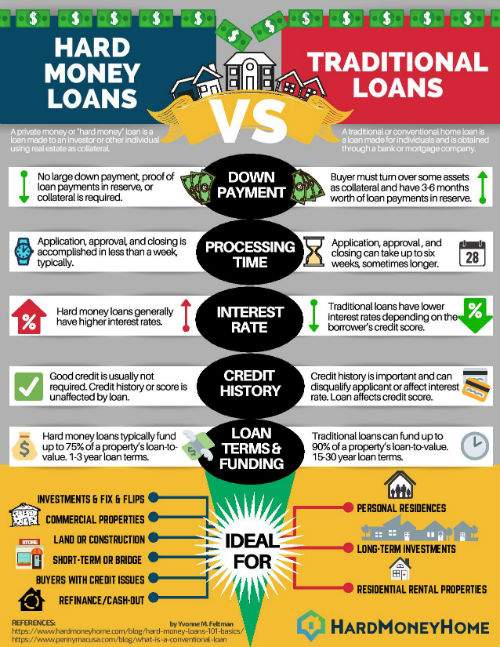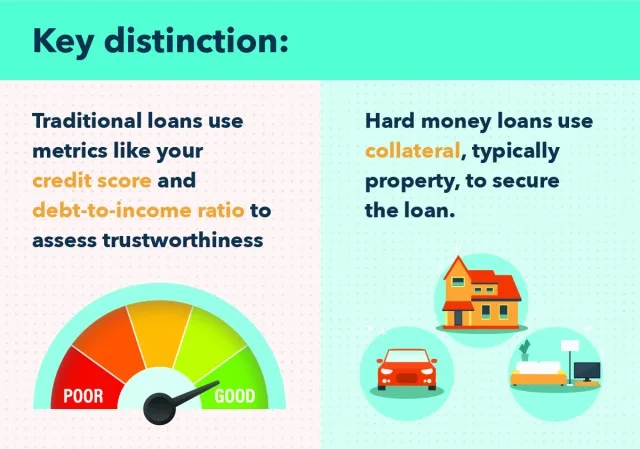When it comes to securing funding for various purposes, understanding the differences between a traditional loan and a hard money loan is crucial. While both loan options serve as financial solutions, they differ significantly in terms of requirements, approval processes, and repayment terms. While traditional loans are typically offered by banks and other financial institutions, hard money loans are commonly provided by private lenders. In this article, we will explore the main distinctions between these two loan types to help you make informed decisions when it comes to your borrowing needs.

Interest Rates
Traditional Loans
Traditional loans typically offer lower interest rates compared to hard money loans. This is because traditional loans are typically secured by collateral and require a thorough credit evaluation process. Lenders offering traditional loans have the assurance of the borrower’s financial stability and creditworthiness, allowing them to offer competitive interest rates.
Hard Money Loans
On the other hand, hard money loans often come with higher interest rates. These loans are usually provided by private lenders or investors who are more concerned with the value of the collateral rather than the borrower’s creditworthiness. Since hard money loans are considered riskier, lenders compensate for this risk by charging higher interest rates.
Collateral Requirements
Traditional Loans
Traditional loans typically require collateral, such as real estate, vehicles, or business assets, to secure the loan. The collateral serves as a way for lenders to mitigate their risk and provides assurance that they can recover their funds if the borrower defaults on the loan. The value and quality of the collateral play a crucial role in determining the loan amount and terms.
Hard Money Loans
Hard money loans also require collateral, but the requirements may be less stringent compared to traditional loans. Lenders of hard money loans often focus on the value of the asset rather than the creditworthiness of the borrower. This means that borrowers with less-than-perfect credit scores or unique circumstances may still be eligible for a hard money loan as long as they have valuable collateral to secure the loan.
Credit Score Requirements
Traditional Loans
Traditional loans heavily consider the borrower’s credit score and credit history as a determining factor for loan approval. Lenders typically set a minimum credit score requirement, and borrowers with higher credit scores generally receive more favorable loan terms. A good credit score demonstrates a borrower’s ability to manage debt responsibly and lowers the lender’s perceived risk.
Hard Money Loans
Hard money loans are less reliant on credit scores and may be a viable option for borrowers with lower credit scores or past financial difficulties. While credit scores are still taken into consideration, hard money lenders focus more on the value of the collateral and the potential for loan repayment rather than the borrower’s credit history. This flexibility allows borrowers with poor credit to access financing they may not qualify for with traditional loans.
Approval Process
Traditional Loans
The approval process for traditional loans involves a detailed evaluation of the borrower’s financial history, creditworthiness, income, and repayment capability. Lenders typically request documentation such as tax returns, bank statements, pay stubs, and employment verification. This process can take several weeks or even months to complete, as lenders thoroughly assess the borrower’s eligibility and the risk associated with the loan.
Hard Money Loans
Compared to traditional loans, the approval process for hard money loans is generally much quicker. The focus is primarily on the collateral provided by the borrower, rather than extensive documentation and credit evaluations. Hard money lenders prioritize the value and potential of the collateral, allowing borrowers to receive funding in a shorter amount of time. This expedited process can be beneficial for borrowers who need immediate financing or have unique financial circumstances.

Loan Term
Traditional Loans
Traditional loans typically offer longer loan terms compared to hard money loans. Depending on the type of loan and purpose, loan terms for traditional loans can range from a few years to several decades. The extended loan term allows borrowers to make lower monthly payments and suits those who require long-term financing for large purchases, such as homes or businesses.
Hard Money Loans
Hard money loans typically have shorter loan terms. Since the focus is on the collateral rather than the borrower’s creditworthiness, the loan term is often shorter to ensure a quicker repayment and to minimize the lender’s risk exposure. These loans are commonly used for short-term financing needs, real estate investments, or situations where traditional loans are not available.
Loan Amount
Traditional Loans
Traditional loans typically offer higher loan amounts since they consider various factors such as the borrower’s income, credit history, and collateral value. Lenders are more willing to provide larger loans when they have confidence in the borrower’s ability to repay and have suitable collateral to act as security for the loan. The loan amount can vary significantly depending on the borrower’s financial situation.
Hard Money Loans
Hard money loans may have lower loan amounts compared to traditional loans, mainly because the collateral’s value serves as the primary factor in determining the loan amount. However, hard money loans can be an attractive option for borrowers who may not qualify for larger traditional loans, as they can still access financing based on the collateral’s value, even with limited creditworthiness.

Documentation
Traditional Loans
Traditional loans require extensive documentation to assess the borrower’s financial stability and creditworthiness. This typically includes tax returns, bank statements, pay stubs, proof of assets, and other relevant financial records. Lenders require these documents to evaluate the borrower’s ability to repay the loan and to ensure the loan is suitable for their financial situation.
Hard Money Loans
The documentation required for hard money loans is comparatively less extensive. While lenders still require some form of documentation, the emphasis is primarily on the collateral’s value and potential rather than the borrower’s financial history. This streamlined documentation process allows borrowers to access funding more quickly and may be beneficial for those with unique financial circumstances.
Flexibility
Traditional Loans
Traditional loans offer various options and flexibility in terms of loan structures, repayment schedules, and interest rates. Borrowers can often choose between fixed or variable interest rates, different repayment terms, and customize the loan to suit their specific financial needs. This flexibility allows borrowers to select options that align with their long-term plans and financial capabilities.
Hard Money Loans
Although hard money loans may have higher interest rates and shorter loan terms, they offer a different form of flexibility. Hard money lenders are typically more open to providing financing for unconventional properties or challenging circumstances where traditional loans may not be available. This flexibility can be particularly beneficial for real estate investors, house flippers, or individuals seeking funding for unique projects.

Usage
Traditional Loans
Traditional loans are commonly used for various purposes, including buying homes, financing education, starting or expanding businesses, or consolidating debts. The versatility of traditional loans allows borrowers to access substantial funding for major life events or long-term goals. However, the usage may be subject to lender approval and comply with the loan’s intended purpose.
Hard Money Loans
Hard money loans are generally used for specific purposes, often related to real estate investments or short-term financing needs. These loans can be used for purchasing real estate, renovating properties, or even funding time-sensitive projects. The usage of hard money loans is often more flexible than traditional loans, as they cater to unique circumstances and unconventional investments.
Lender Involvement
Traditional Loans
Traditional lenders, such as banks or credit unions, typically have extensive involvement throughout the loan process. They evaluate the borrower’s financial history, perform credit checks, and conduct thorough assessments to determine loan eligibility. Traditional lenders may also provide ongoing support and assistance throughout the repayment period, offering guidance and options for refinancing or modifying the loan if necessary.
Hard Money Loans
Hard money lenders typically have less involvement in the borrower’s financial history and credit evaluation. Their primary focus is on the collateral and its potential value, allowing for a simpler approval process. Once the loan is approved, hard money lenders may have limited involvement, primarily overseeing the repayment and ensuring the collateral’s value remains intact. Borrowers seeking hard money loans should ensure they have a clear plan to repay the loan as agreed upon.
In conclusion, there are clear differences between traditional loans and hard money loans in terms of interest rates, collateral requirements, credit score requirements, approval process, loan term, loan amount, documentation, flexibility, usage, and lender involvement. Understanding these distinctions is crucial for borrowers to make informed decisions and choose the appropriate financing option based on their specific financial needs and circumstances. Whether opting for a traditional loan with lower interest rates and longer terms or a hard money loan offering flexibility and quicker approval, borrowers can find a loan that aligns with their goals and financial capabilities.




